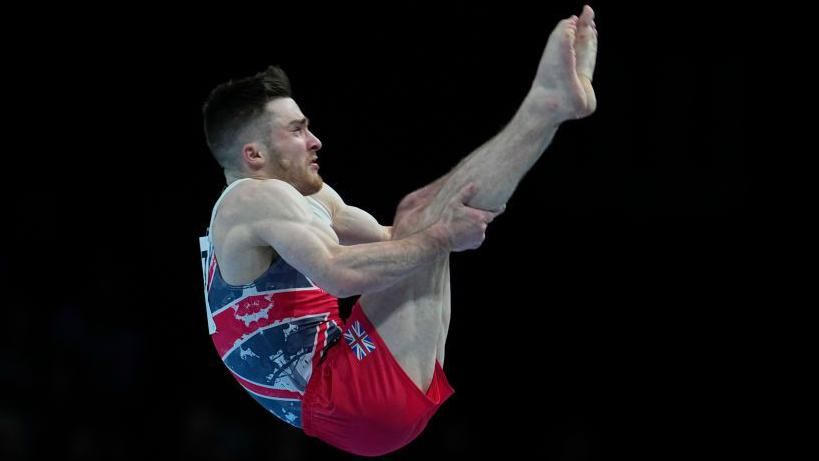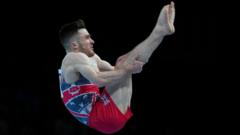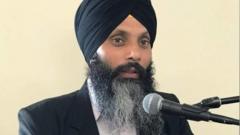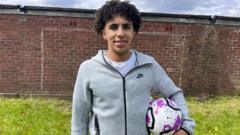
Harry Hepworth beat Olympic champion Artem Dolgopyat in Germany earlier this year
If Max Whitlock calls a team-mate “one to look out for”, it is probably worth listening to him.
Britain’s most successful gymnast was talking about 20-year-old Harry Hepworth, who is heading to the European Championships this week in hot form.
It is a far cry from the three years he had as a child where he was unable to do any sport because of a hip condition that has left him with one leg shorter than the other.
Hepworth has already beaten an Olympic champion this year when he edged Artem Dolgopyat to take floor gold at the World Cup in Cottbus, Germany, and claimed the national rings title to put himself in the frame for selection for this summer’s Paris Games.
Before that, he will chase European success as Great Britain travel to Rimini, Italy, hoping for another successful continental championships after topping the medal table last year.
You can watch some of the action on the BBC as the men compete from 24 to 28 April before the women are in action from 2 to 5 May.
Whitlock is not competing after sustaining a minor knock to his wrist so BBC Sport speaks to some of the other gymnasts to keep an eye on.
Shorter leg ‘an advantage’ for rising star Hepworth
When a local gymnastics coach came to his primary school, it changed Hepworth’s life.
“He performed a backflip. All I wanted to do after that was a backflip so I got myself signed up at Leeds Gymnastics Club and did a backflip and then kept going ever since,” he said.
For three years before that, from the age of five, he had been told not to do sport because he had Perthes disease, which affects the hip joint in children.
His right leg is 4cm shorter than his left, which he thinks has helped him with some of his tumbling in floor routines.
“The coaches like to say it gives me more torque off the floor when I go into twists because I might be leaning slightly so I guess it’s helped me in some ways,” he said.
“More force tends to go through one side and then it sort of hurts my back sometimes but other than that I think it it’s been a bit of an advantage for me.”
Hepworth upstaged his more experienced team-mates at the British championships last month, beating his idol Courtney Tulloch – the 2022 world bronze medallist – to the rings title.
He joins Tulloch, British all-around champion Joe Fraser, world vault champion Jake Jarman, James Hall and Luke Whitehouse at the Europeans.
“You’ve got to be a perfectionist and he’s definitely one of them,” Whitlock said of Hepworth. “He’s definitely one for the future, one who can hopefully bring us a lot of [good] results.”
Kinsella ‘so close to retiring’ last year with depression
When Alice Kinsella started treatment for acne, she did not think it might leave her on the verge of quitting her sport.
The 23-year-old, who helped Great Britain to a surprise women’s team bronze at the Tokyo Olympics, said she went on the contraceptive pill to help her skin condition but ended up developing anxiety and depression last year.
“I didn’t want to do gym any more. I was so close to retiring,” she said.
“I wouldn’t think that I’d be here today probably being the best I ever am. I feel in a really, really good place.”
Kinsella had to withdraw from last month’s British championships with an injury but has recovered and will seek to add to her five European medals.
Ondine Achampong, Kinsella’s successor as national all-around champion, will lead the British women’s charge, with Becky Downie, Ruby Evans and Georgia Mae-Fenton also on the team as they seek to defend their European title.
‘We made a difference’ – Downie proud legacy will last
Becky Downie, who was controversially not selected for the Tokyo Games, says she had thought she would be retired by now but a “belief deep down” that she could achieve an Olympic medal on the uneven bars has kept her in the sport.
A silver medal on the apparatus at last year’s European championships gave her extra confidence and, with an even more difficult routine now, she is hopeful of yet more success.
Although, give her the choice between a gymnastics medal and her MBE, she would pick the latter every time.
She and her sister Ellie were given the award earlier this year after speaking publicly about abuse in their sport before a review that led to reform in gymnastics.
“To leave that kind of legacy … people forget about the medals but I’m hoping that in five, 10, 20 years’ time, we’re going to look back at this time and be like ‘we actually did, that we made a difference,” she said. “We made an impact.'”
How can I watch the European Gymnastics Championships on the BBC?
All times BST. Coverage can be subject to late schedule changes, so details may differ from this page.
Men’s championships (24-28 April) – BBC Sport website and app
Friday, 26 April -17:00-19:30: apparatus finals
Saturday, 27 April -15:30-18:00: apparatus finals
Sunday, 28 April – 14:30-17:00: team final
Women’s championships (2-5 May) – BBC Sport website and app
Saturday, 4 May – 15:15-18:40: apparatus finals
Sunday, 5 May – 14:30-17:00: team final



